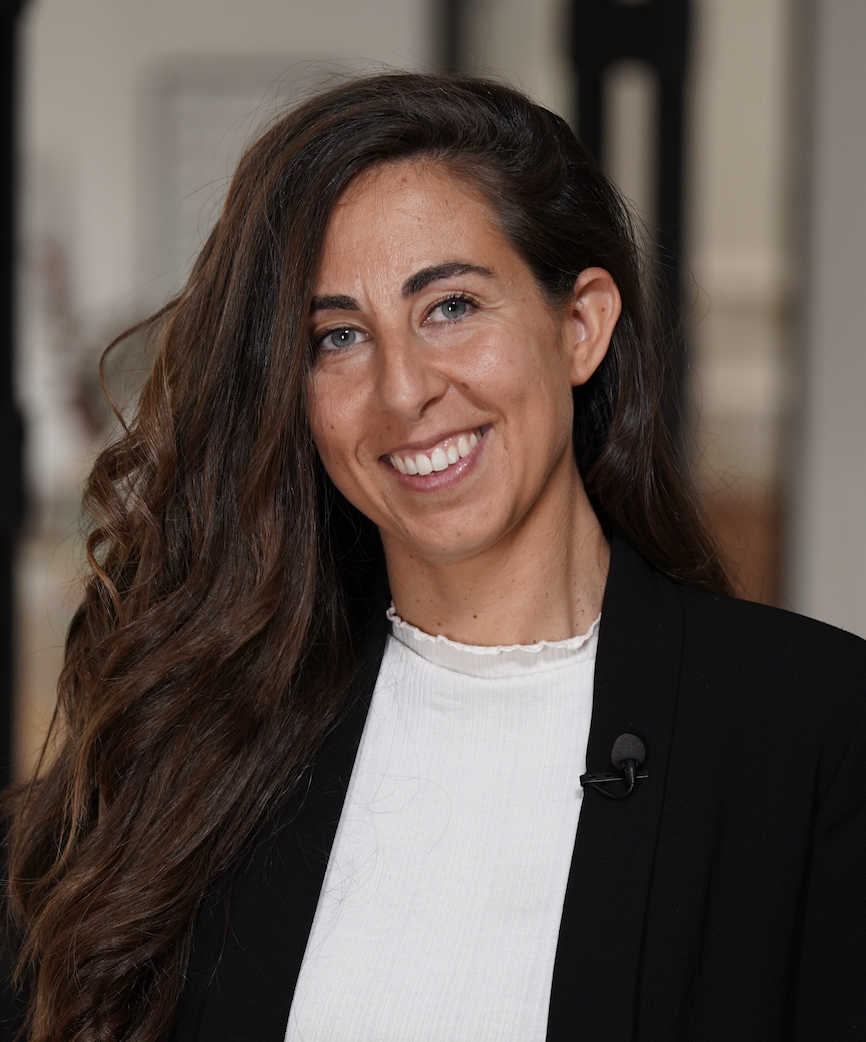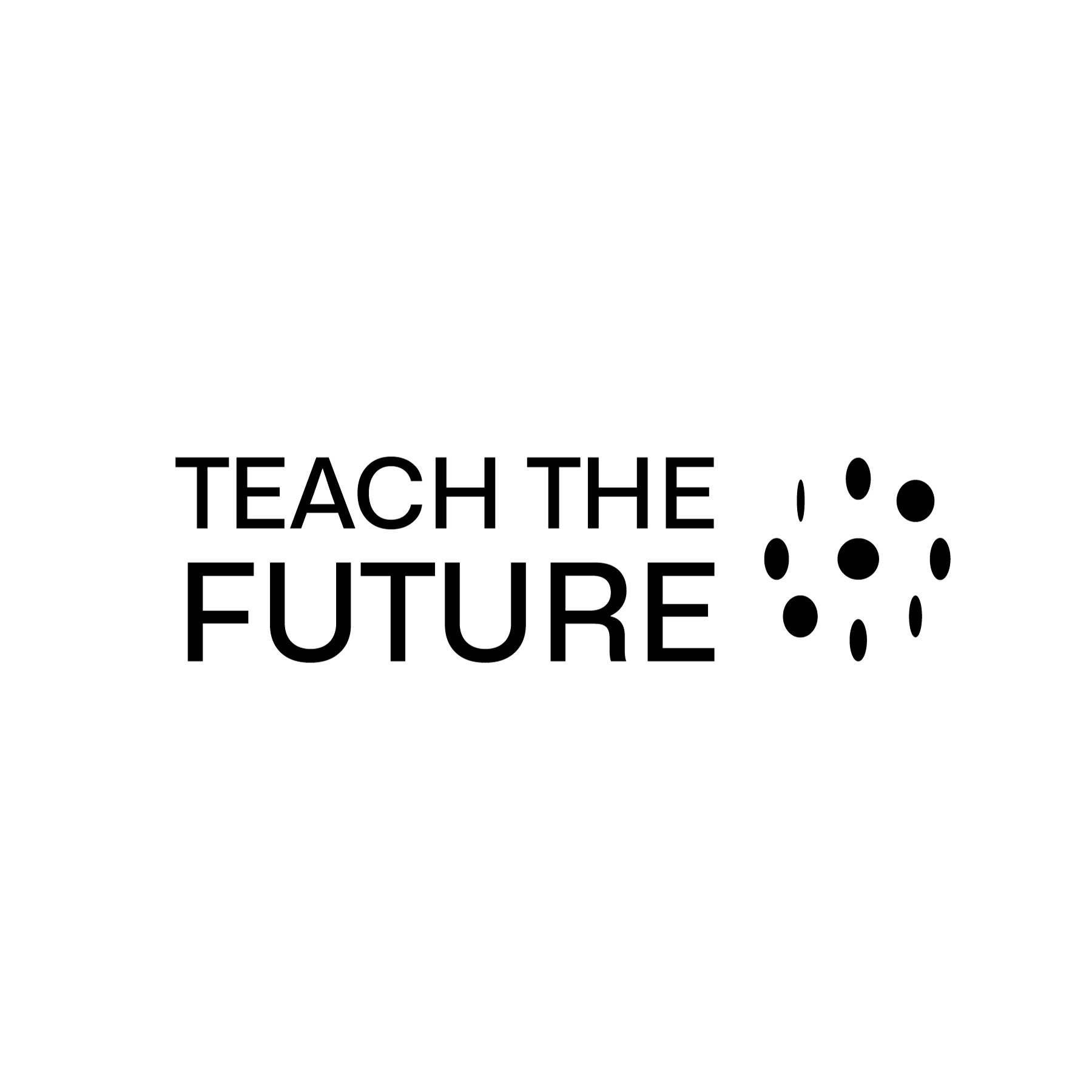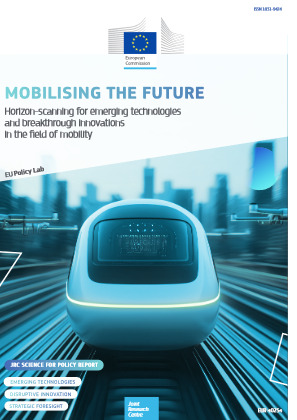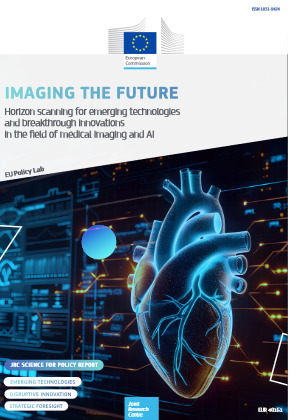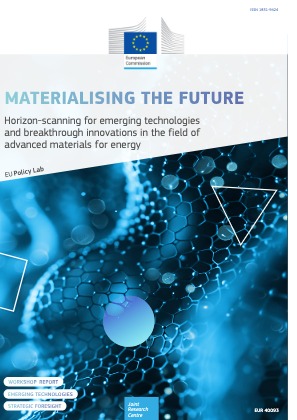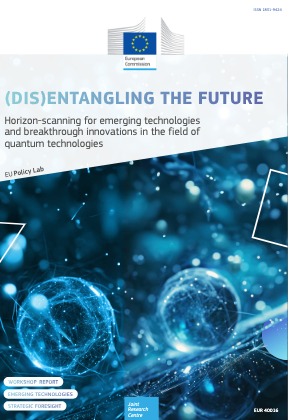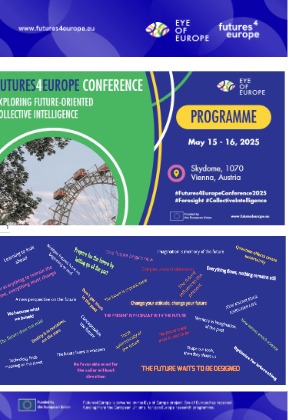The FUTURINNOV project run by European Commission Joint Research Centre (JRC) supports the European Innovation Council (EIC) in building strategic intelligence capacity through foresight and other anticipatory approaches. This is done through activities to identify funding priorities, inform programme design, contribute to policy feedback, and develop institutional governance.
The main objectives are to:
• Provide short and medium-term future-oriented evidence-based advice on signals and trends of emerging technologies, breakthrough innovation, and investment patterns;
• Support the development of long-term EIC strategic intelligence, grounded in anticipatory, collective, and hybrid methods, towards knowledge transfer and capacity building; and
• Explore innovative anticipatory thinking and future-oriented methodologies to support EIC in its mission as a funding body and a knowledge- provider for policy design and implementation.
The project started in the beginning of the 2024 and will run until February 2025. Outputs of the FUTURINNOV project will include three literature reviews identifying and analysing signals of emerging technologies and breakthrough innovations as well as findings from horizon scanning workshops.
Eyes on the Future - Signals from recent reports on emerging technologies and breakthrough innovations to support European Innovation Council strategic intelligence - Volume 1
The report provides a literature review of publications authored by numerous external organisations. It summarises 34 signals and trends of emerging technologies and breakthrough innovations across the 11 primary categories of a taxonomy defined by the European Innovation Council (EIC). The authors investigate not only what is deemed most novel in multiple application domains but what is worth the attention of European Union (EU) policy audiences involved with priority-setting and decision-making. The literature review
(1) reviews and evaluates 186 reports and articles on emerging technologies,
(2) captures 489 signals, of which 86 have been short-listed and 34 selected for this report,
(3) creates an internal database of signals which is used to digest and analyse the evolution of signals and novel technologies
(4) connects signals with EIC portfolios and other European Commission (EC) initiatives such as policies surrounding critical technologies and Strategic Technologies for Europe
Platform (STEP) investments that, together with the primary and secondary levels of the EIC taxonomy, provide multiple types of analysis and insights(5) draws conclusions that aim to support the EIC’s funding prioritisation and additionally, provide reflections on EIC portfolio setting.
Read some insights from the blog.
Eyes on the Future - Signals from recent reports on emerging technologies and breakthrough innovations to support European Innovation Council strategic intelligence - Volume 2
The second volume of the literature review with 30 selected signals and trends that were considered particularly relevant to the 10 critical technology areas identified by the Commission. Some examples are:
• Neuromorphic chip optimised for energy efficient AI workloads
• Laser-equipped satellites for secure quantum communications
• Possibilities of microgravity bioreactors and 3D bioprinting for regenerative medicine
• Self-consuming rockets to reduce space debris and improve efficiency
• Potential to capture wasted 'reflected' energy from PV systems
• Preparation–free, adhesive skin patches to help people control robotic exoskeletons.
Eyes on the Future - Signals from recent reports on emerging technologies and breakthrough innovations to support European Innovation Council strategic intelligence - Volume 3
This literature review report focuses on signals based on emerging technologies developed by non-EU countries and summarises findings in a final selection of 30 signals and trends clustered according to the 10 critical technology areas defined by the European Commission, as well as through other frameworks such as the Strategic Technologies for Europe Platform and the EIC’s portfolios and specific taxonomy. The report identifies topics, including climate-adaption tech, neurotech, digital and network security and critical raw materials, as areas deserving of further research and development.
The report provides insights for the EIC to anticipate technological developments and address potential security concerns, ensuring the EU's position at the forefront of global innovation.
Read some insights from the blog.
(Dis)Entangling the Future - Horizon scanning for emerging technologies and breakthrough innovations in the field of quantum technologies
This report documents the process and findings of a horizon scanning exercise, part of a series under the FUTURINNOV. The workshop, held on 24 April 2024, had as its primary goal the evaluation and prioritisation of trends and signals on emerging technologies and breakthrough innovation, across all technology readiness levels (TRLs) and within the EIC's Quantum technologies portfolio. Signals for the workshop were gathered from experts, literature review, and text/data mining of patents, publications, and EU-funded projects.
These signals were then scrutinised for their significance to the field's future by a diverse group of sector experts which led to the identification of nine key topics:
•quantum computers
•quantum sensing
•quantum algorithms for lattice-based computational fluid dynamics models
•materials for quantum
•Artificial Intelligence for quantum
•error correction; solid-state scalability
•quantum for Artificial Intelligence
•quantum as a service – metacloud
Furthermore, the workshop identified additional wild cards with high novel-ty and disruptive potential such as quantum sensing AI on edge and molecular spin qubits. Participants also highlighted various factors that could influence the development, adoption, and promotion of these emerging technologies, which can be grouped under the following categories: technical advancements; investment and infrastructure support; cross-sector collaboration; regulatory navigation; talent acquisition; market maturity; and application utility.
Materialising the Future - Horizon scanning for emerging technologies and breakthrough innovations in the field of advance materials for energy
This report documents the process and findings of a horizon scanning exercise on emerging technologies in advanced materials for energy. Signals for the workshop were gathered from experts, literature review, and text/data mining of patents, publications, and EU-funded projects. These signals were then scrutinised for their significance to the field's future by a diverse group of sector experts which led to the identification of nine key topics:
- accelerated material design/synthesis
- biomaterials as part of the circular economy
- advanced materials allowing new applications
- closed loop battery recycling
- innovations in catalysis
- organic batteries for sustainable energy storage
- design to performance bat-teries
- design to cost batteries
- electrochemical water treatment
Furthermore, the workshop identified additional wild cards with high novelty and disruptive potential such as: circularity of materials (safe and sustainable by design); membranes / separators; process optimisation; 3D printing of electrode materials for energy and environmental engineering applications; and use of AI for the study of materials.
Participants also highlighted various factors that could influence the development, adoption, and promotion of these emerging technologies, which can be grouped under the following categories: governance and compliance frameworks; funding; collaboration and knowledge exchange; sustainable and efficient development; infrastructure and technological advancement and limita-tions; industry and market dynamics and constraints; innovation and risk management; supply chain and raw materials; and talent development.
Imagine the future - Horizon scanning for emerging technologies and breakthrough innovations
in the field of medical imaging and AI
This report documents the process and findings of a horizon scanning exercise, part of a series under
the FUTURINNOV project. The workshop, held on 17 September 2024, had as its primary goal the evaluation and prioritisation of trends and signals on emerging technologies and breakthrough innovation, across all technology
readiness levels (TRLs), within the EIC's Medical Imaging and AI portfolio.
Signals for the workshop were gathered from experts, literature review, and text/data mining of pa-
tents, publications, and EU-funded projects. These signals were then scrutinised for their significance
to the field's future by a diverse group of sector experts which led to the identification of eight key
topics:
- generative AI for healthcare
- digital twins
- multimodal data analysis
- explainable AI in medical imaging
- application of AI to specific diseases/conditions
- XR - augmented and virtual realities
- tensor-valued diffusion encoding
- AI-generated synthetic data for training AI
Furthermore, the workshop identified additional wild cards with high novelty and disruptive potential such as: blockchain, edge computing and differential privacy for secure, AI-driven medical imaging and collaborative healthcare
optimisation and quantum medical imaging.
Participants also highlighted various factors that could influence the development, adoption, and pro-
motion of these emerging technologies, which can be grouped under the following categories: Tech-
nological advancements and cross-sector applications; data infrastructure, AI models, and regulatory
frameworks; workforce, education and societal factors; clinical efficiency and patient outcomes; trust,
ethics, and AI adoption; financial pressures and industry investment in AI healthcare.
Mobilising the future - Horizon scanning for emerging technologies and breakthrough innovations in the field of mobility
This report documents the process and findings of a horizon scanning exercise, part of a series under the FUTURINNOV project. The workshop, held on 16 October 2024, had as its primary goal the evaluation and prioritisation of trends and signals on emerging technologies and breakthrough innovation, across all technology readiness levels (TRLs), within the broad Mobility domain, broken-down into four key areas:
- transport systems, networks and multimodality
- automotive and roads
- rail/freight and logistics
- aviation and airports.
Signals for the workshop were gathered from experts, literature review, and text/data mining of patents, publications, and EU-funded projects. These signals were then scrutinised for their significance to the field's future by a diverse group of sector experts which led to the identification of 22 different key topics across the key areas above. These signals can be seen as hotspots of innovation that deserve the EIC’s attention for possible future support.
Participants also highlighted various factors that could influence the development, adoption, and promotion of these emerging technologies, which are presented in the report as drivers, enablers and barriers, and analysed specifically in each of the 4 key areas.
Securing the Future Horizon scanning for emerging technologies and breakthrough innovations in the field of digital and network security
This science for policy brief documents the process and findings of a horizon scanning exercise, part of FUTURINNOV project. The workshop, held on 13 November 2024, had as its primary goal the evaluation and prioritisation of trends and signals on emerging technologies and breakthrough innovation, across all technology readiness levels (TRLs), within the digital and network security domain. Signals for the workshop were gathered from experts, literature review, and text/data mining of patents, publications, and EU-funded projects.
These signals were then scrutinised for their significance to the field's future by a diverse group of sector experts which led to the identification of eight key topics:
- deepfake detection
- quantum-resistant algorithms
- interoperability for end-to-end encrypted messaging systems
- privacy and security in virtual reality
- false data injection attack detection
- inter-satellite communication
- privacy-preserving machine learning
- tiny solar-powered drones capable of near-perpetual flight
Participants also highlighted various factors that could influence the development, adoption, and promotion of these emerging technologies including: tensions between privacy and security, emerging geopolitical threats, technological and regulatory enablers, trust and transparency, and the economic barriers that shape technological development and adoption.
Healing the Future - Horizon scanning for emerging technologies and breakthrough innovations in the field of cell and gene therapies
This brief documents the process and findings of a horizon scanning exercise, in the context of FUTURINNOV collaboration between the European Innovation Council (EIC) and the Joint Research Centre (JRC), aiming to support the EIC's strategic intelligence through foresight and other anticipatory methodologies.
The workshop, held online on 15 May 2025, had as its primary goal the evaluation and prioritisation of trends and signals related to emerging technologies and breakthrough innovation, across all technology readiness levels (TRLs), within cell and gene therapies.
Signals for the workshop were gathered from experts, literature review, and text/data mining of patents, publications, and EU-funded projects. These signals were then scrutinised for their significance to the field's future by a diverse group of sector experts, which led to the identification of seven key topics: in vivo gene therapy; microphysiological pre-clinical models; stem cells in multiple applications; new tools for advanced tissue delivery; in silico & AI; conversion of tumour cells; and emerging genome and epigenome-based therapies.
Participants also highlighted various contextual factors that could influence the development, adoption, and uptake of emerging technologies within this field, including in domains such as: competitiveness and geopolitics; talent and expertise; cross-border and cross-sector collaboration; funding, economic and market conditions; regulatory, safety and ethical challenges; health and RDI ecosystems; and infrastructure and manufacturing.
Embodying the Future - Horizon scanning for emerging technologies and breakthrough innovations in the field of human-like AI systems
This technology foresight brief documents the process and findings of a horizon scanning exercise, in the context of FUTURINNOV. The workshop, held online on 19 June 2025, had as its primary goal the evaluation and prioritisation of trends and signals related to emerging technologies and breakthrough innovations across all technology readiness levels (TRLs) within human-like AI systems. Signals for the workshop were gathered from experts, literature review, and text/data mining of patents, publications, and EU-funded projects.
These signals were then scrutinised for their significance to the field's future by a diverse group of sector experts, which led to the identification of twelve key topics: enhancing human-AI collaboration; trustworthy and explainable AI; neurosymbolic AI; general-purpose neuro-symbolic methods; personalised medicine; embodied intelligence; emotion-aware AI; multi-agent frameworks; human-AI collective cognition; brain-inspired AI; addressing AI’s energy demand; and next generation LLMs.
Several contextual factors that shape the development and uptake of AI are highlighted across social, technological, economical, environmental and political and regulatory domains, including: AI literacy; inter-disciplinary and inclusive development of models; benchmarking practices; and sustainability.
The outcomes of this exercise may be used to inform future funding topics for EIC Challenges and other EC calls. They can also provide input for EIC and EC reports, as well as supporting other EU policy initiatives.
